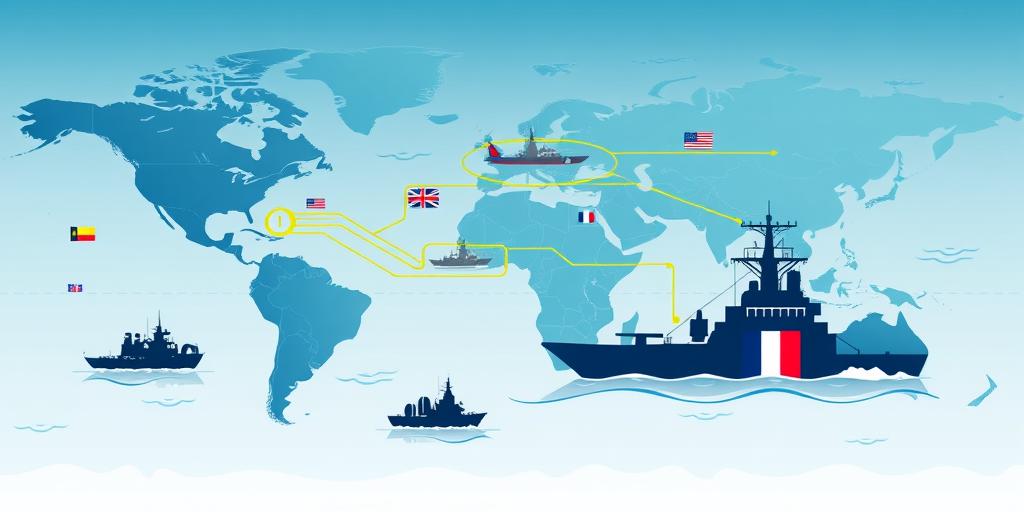The Geopolitics of Maritime Security
The world's oceans are vital arteries for global trade, resource transportation, and strategic power projection. Maritime security, therefore, is not merely a matter of naval patrols and anti-piracy measures; it is deeply intertwined with geopolitics, international relations, and economic stability. This post will delve into the complex geopolitical landscape of maritime security, exploring its key actors, challenges, and implications.
Key Actors and Interests
Several key actors shape the geopolitics of maritime security:
- Nation-States: Coastal states, major naval powers, and countries heavily reliant on maritime trade all have vested interests in securing sea lanes. Their interests often clash due to territorial disputes, resource competition, and differing strategic priorities.
- International Organizations: The United Nations (UN), through bodies like the International Maritime Organization (IMO), sets international standards and promotes cooperation on maritime security issues. Regional organizations also play a crucial role in coordinating efforts within specific geographic areas.
- Non-State Actors: Pirate groups, terrorist organizations, and transnational criminal networks pose significant threats to maritime security. Their activities can disrupt trade, destabilize regions, and undermine the rule of law.
Challenges to Maritime Security
Maritime security faces a range of challenges, including:
- Territorial Disputes: Unresolved territorial claims, particularly in areas like the South China Sea, create friction and increase the risk of conflict. Competing claims over islands,Exclusive Economic Zones (EEZs), and maritime boundaries complicate efforts to establish effective security mechanisms.
- Piracy and Armed Robbery: Despite significant progress in recent years, piracy remains a threat in certain regions, such as the Gulf of Guinea and the Strait of Malacca. Armed robbery against ships can disrupt trade and endanger seafarers.
- Maritime Terrorism: Terrorist groups may seek to exploit maritime routes for attacks on ships, ports, or offshore infrastructure. The potential for large-scale disruptions and devastating consequences makes maritime terrorism a serious concern.
- Illegal Fishing and Resource Exploitation: Unauthorized fishing, smuggling, and other illicit activities deplete marine resources, damage ecosystems, and undermine the economies of coastal states. These activities often involve transnational criminal networks and can fuel regional instability.
- Climate Change: Rising sea levels, changing weather patterns, and ocean acidification pose long-term threats to maritime security. These changes can exacerbate existing tensions, displace coastal communities, and disrupt maritime activities.
Geopolitical Implications
The geopolitics of maritime security has far-reaching implications for global affairs:
- Trade and Economic Stability: Secure sea lanes are essential for international trade and economic growth. Disruptions to maritime trade can have cascading effects on global supply chains, energy markets, and financial systems.
- Power Projection and Influence: Naval powers use their maritime capabilities to project power and influence in key regions. Control of strategic waterways and naval bases can provide significant advantages in geopolitical competition.
- Regional Stability and Conflict Resolution: Maritime disputes can escalate into armed conflicts, particularly in regions with overlapping claims and historical tensions. Effective maritime security mechanisms are crucial for preventing conflicts and promoting regional stability.
- International Law and Governance: Maritime security is governed by a complex web of international laws and agreements, including the UN Convention on the Law of the Sea (UNCLOS). Adherence to these laws is essential for maintaining order and resolving disputes peacefully.
Conclusion
The geopolitics of maritime security is a multifaceted and dynamic field with significant implications for global affairs. Addressing the challenges to maritime security requires cooperation among nation-states, international organizations, and non-state actors. By promoting adherence to international law, fostering dialogue, and investing in maritime security capabilities, the international community can work towards a more secure and stable maritime environment.









